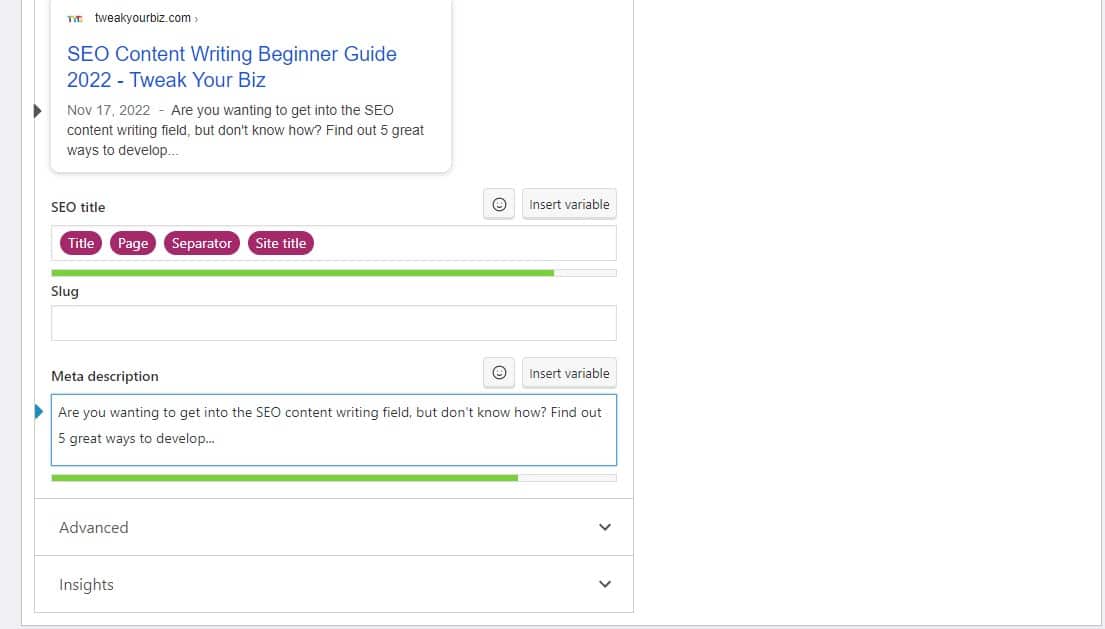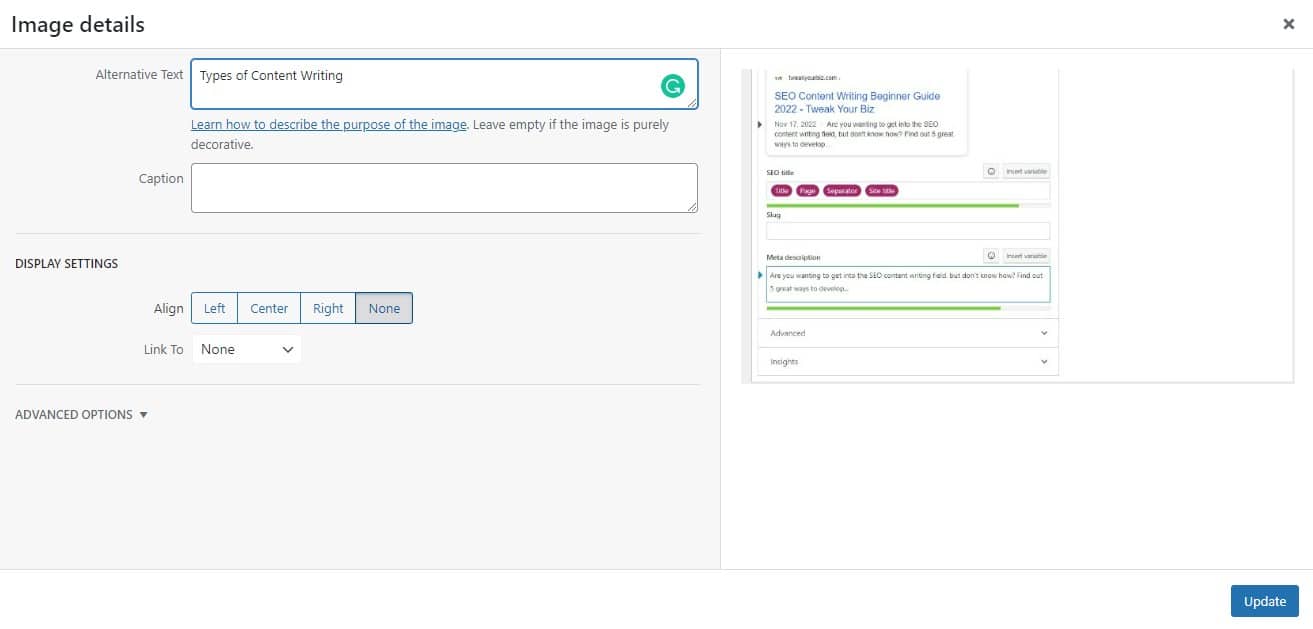If you’re new to SEO content writing, then this guide is for you. In 2023, SEO will continue to be an important ranking factor for Google and other search engines. And that means creating high-quality, keyword-optimized content is more important than ever. If you’d like to skip the nuances and find the best tools for SEO content writing, you could do that too.
In this beginner’s guide, we will discuss:
- What SEO Content Writing Is
- Why You Should Care About Optimizing Content
- How To Start Writing SEO Content
- How To Create A Content Brief
- SEO Content Writing Services
What is SEO Content Writing?
SEO content writing is the process of creating content that is both informative and keyword rich. It’s a delicate balance between the two, and it’s one that takes some practice to perfect.
But once you get the hang of it, you can create content that will help your website rank higher in search engine results pages (SERPs).
Content writing can be different based on the client. Some clients will already have a content strategy in place. Others might require you to use SEO tools, such as keyword research tools, to come up with keyword ideas or even related keywords to what they already have.
The content creation process is also different for everyone. Most clients prefer Google docs, but depending on who you write content for, they may prefer something different.
Most of the time when you are writing content, it is writing blog posts, but clients might ask for the additional web page content to be written. In addition, you may be asked to write social media posts.
Content writing and content marketing mean a lot of things. However, your role as an SEO content writer or SEO copywriter is to help with a client’s search engine rankings.
Why Should You Care About Optimizing Your Content for Search?
If you want your website to be successful, then you need to care about SEO. Why? Because SEO is what helps you rank higher in SERPs. And the higher you rank, the more traffic you’re likely to get.
The main goal of an SEO content writer is to optimize the content they write so that Google Analytics is more likely to rank it on the first page based on its algorithm. That is why search engine optimization is so important.
In addition to ranking high, some high-quality content will become what is known as a featured snippet on Google. This means that the content of the article answered a specific question on Google, and the SEO elements were better than other web pages using those same keywords.
Then, a small piece of your content, or featured snippets, is displayed on the drop-down boxes when search queries are conducted.
There are a lot of ranking factors that go into ranking on Google. Some of those include:
- Important Keywords
- Existing Content
- Organic Traffic
- Meta Descriptions
- Quality of Web Content
Remember the goal is to get to the first page of Google. The more organic traffic you have, and the more you understand search engine algorithms, the more success you’ll have landing on a search engine results page. Although, that is just a small piece of the SEO writing puzzle.
Finding a target keyword you can have success with is not hard if you know what you are looking for. Read on to get a better idea of what you can do to have a successful career as an SEO content writer.
How to Start Writing SEO Content
Now that you know what writing SEO content is, you might be wondering, how do I start? It’s not hard if you know the basics. The writing process is a little different than it is for other types of writing.
Here are five things to know before writing SEO content:
- Research What To Write
- Understand Your Target Audience
- Do Keyword Research
- Reverse Engineer Search Engines
- Use Your Keyword Throughout The Meta Data
Research What to Write
SEO content writing starts with research. You need to understand your target audience and what they’re looking for before you start writing. That way, you can create content that is both informative and keyword rich.
To do this, start by brainstorming a list of topics that your target audience would be interested in. Then, use Google’s Keyword Planner, or a similar tool like Moz Keyword Explorer, to research which of those topics are most popular. Once you have a list of keywords, you can start writing your content.
Remember, you want to sound credible and informative, but also keep the writing interesting for your reader. No one likes dry topics, so it is your job to make it engaging.
Understand Your Target Audience
Before you start writing, it’s important to understand who your target audience is. What are their interests? What are they looking for? By understanding your target audience, you can create content that appeals to them.
For example, if your target customer uses a lot of social media, you do not need to explain what social media is to them in your post.
Another example is trade magazines. Most people reading a trade publication already know the field fairly well. That means you can skip the basics, in most cases.
Knowing your target audience well can go a long way in sounding credible. If you are telling them what they already know, they might question your authority on the topic.
Do Keyword Research
Once you know what your target audience is looking for, it’s time to do some keyword research. This will help you find the right keywords to use in your SEO content.
When doing keyword research, try to find a tool that is as comprehensive as possible. One that shows keywords, suggests related keywords, has organic search and direct traffic metrics, and also shows how many other websites are competing to rank for that keyword.
It is a waste of time to try to rank for keywords that you have no chance of ranking for. Quality content only goes so far in the SEO world. Try to target keywords that have a lower amount of competition. You should also be tracking your efforts with a keyword tracking tool also, but more on that in another post.
Reverse Engineer Search Engines
One of the best ways to optimize your content for search engines is to reverse engineer them. That is, take a look at how they work and what they’re looking for. Google’s algorithm is constantly changing, so it’s important to stay up-to-date on the latest trends. A good way to do this is to read Google’s Webmaster Guidelines.
A lot of SEO writing boils down to how well you know the system. When starting out, it is fine to not know it well. But soon, you will be well on your way to success.
Use Your Keyword Throughout the Meta Data
Once you’ve written your content, it’s important to use your keywords throughout the meta data. This includes the title, description, and keywords tags. By doing this, you’re helping search engines understand what your content is about and how to index it.
Create a Content Brief Including:
Headings (H1s, H2s, H3s, H4s)
When creating a content brief, setting up the headings in a way that not only flows for the reader but is SEO optimized is very important.
Introductions to each section, usually under the H2s, should highlight the upcoming H3s and H4s. This can be done with a bulleted or numbered list.
Meta Description
The meta description is the short paragraph of text that appears under your title in the SERP.
The meta description is important because it is one of the first things that people see when they do a search. It should be catchy and persuade the person to click on your result.
A good meta description should:
- Be no more than 155 characters
- Include your keyword
- Be unique to each page
One key to writing a great meta description is to leave the reader wanting more. Make them want to click on your article. You can do this by writing a great hook to reel them in, and then leave the solution open-ended.
Please see the example below:

In that example, you have left it open. What can they develop? Now they are interested.
Word Count
The word count of your SEO content should be based on the topic you are covering. There isn’t a magic number that you should aim for, but generally, longer articles tend to do better than shorter ones.
This is because longer articles are usually more comprehensive and provide more value to the reader. However, if you try to stuff too many keywords into your content, it will read awkwardly and turn off your readers.
Pro Tip: try an SOE Content Writing Service to help with word count.
Number of Images
Images are a great way to break up your text and add visual interest to your content.
However, you should only use images that are relevant to your topic. In general, it’s a good idea to include at least one image per 500 words of text. This ensures that your content is well-balanced and easy to read.
Image File Names
When you save your images, make sure to use relevant file names.
For example, if you’re writing about “how to make a perfect cup of coffee,” your image file name should be something like “coffee-making-process.jpg.”
This helps search engines understand what your image is about and how it relates to your content.
Including Keywords in Your Images
As well as using keywords in your image file names, you should also include them in the “alt text” and “title” tags. The image alt text is the text that appears when an image can’t be displayed. The title tag is the text that appears when you hover over an image.
By including keywords in your title tags, you’re helping search engines understand what your images are about. This can help your content rank higher in image search results.

Link to High-Quality Sources
When you’re writing SEO content, it’s important to link to high-quality sources. This shows search engines that you’re an authoritative source of information.
However, be sure to avoid linking to competitor articles. It is important for an SEO writer to understand the difference between a high-quality source and the competition’s web page.
Remember, you’re helping your client with their content marketing, not the competition.
Internally Link to Other Articles
In addition to linking to external sources, you should also link to other articles on your website. This is known as “internal linking.”
Internal linking is important because it helps search engines understand the structure of your website. It also helps readers navigate your website and find other articles that they might be interested in.
Internal links can help to increase traffic to existing content. Most clients will want their content writers to use internal links in their articles. Although, some clients will do it on their own before publishing.
Use Keywords Naturally
When you’re writing SEO content, it’s important to use keywords naturally. This means using them in a way that sounds natural and doesn’t interrupt the flow of your writing.
By using keywords unnaturally, you are doing what is known as “keyword stuffing”. While this sounds great in theory, it makes the blog post, or article, difficult to read.
Also, too many keywords in the text are bad for your SEO strategy. You should never sacrifice content quality in order to use more keywords.
For example, if you’re writing about “how to make a perfect cup of coffee,” you might include the following keywords:
- coffee beans
- water
- coffee maker
- mug
Remember to use keywords throughout your content, including in the title, headings, and body text.
Make Sure Your Content Is Easy to Read
When you’re writing SEO content, it’s important to make sure that it’s easy to read. This means using short sentences and paragraphs and including plenty of white space.
It also means breaking up your text with subheadings, bullet points, and images. By making your content easy to read, you’re more likely to keep people’s attention and persuade them to stay on your page.
SEO Content Writing Services
Verblio
Verblio’s SEO content writing services can help you create high-quality, keyword-optimized content that ranks high in search engine results.
We have a team of experienced writers who are experts in creating SEO-friendly content. We can help you with everything from blog posts and articles to eBooks and website copy.
Over 1,000 Digital agencies, in-house marketers, and publishers are already using Verblio to create polished content.
Writing for SEO is not easy by any stretch of the imagination, but Verblio and its team of writers produce quality content with ease.
Founded by a journalist, Verblio treats its writers right. That is great news for both the freelance writers that compose their team and the businesses that use them. Happy writers create content that ranks.
WordAgents
WordAgents is a content writing agency that specializes in creating SEO-friendly content. We have a team of experienced writers who can help you with all your content needs.
They offer a range of services, including blog writing, article writing, and web copywriting. We can also help you with more specialized content, such as eBooks and infographics.
WordAgents’ main goal is to keep readers and Google happy. With an optimized workflow. WordAgents guarantees delivery within seven days, per 10,000 words.
Their SEO writing starts at $0.06 per word. This is perfect for any budget size. Before you know it, you’ll have SEO content that is free of grammatical errors, and ready to help you rank on Google.
FATJOE
FATJOE is a full-service content marketing agency that can help you with all your content needs. They offer a range of services, including SEO copywriting, link building, and social media marketing. They have a team of experienced writers who can create high-quality, keyword-optimized content that ranks high in search engine results.
FATJOE uses top SEO writers to create enticing, SEO-optimized content. Within 48 hours, a project will be completed, along with unlimited revisions for up to 10 days.
Once you place an order, the writing team starts the process. This service is great for businesses, and a great opportunity for writers to showcase their SEO writing talents.
Search Engine Writing Wrap Up
Search engine writing is all about creating content that’s optimized for both search engines and readers.
To do this, you need to use keywords throughout your content, link to high-quality sources, and make sure your content is easy to read.
If you’re not sure how to write SEO content, you can hire a professional content writing service or use an SEO services provider. These services can help you create content that’s both keyword-rich and easy to read.
By following these tips, you can make sure that your content is optimized for both search engines and readers. This will help you attract more traffic to your website and improve your chances of ranking higher in search results.
The entire process of being an SEO writer may seem complicated at first, but it is very easy to get up to speed. You just need the right tools, confidence, and determination.
Bringing your expertise to the table will make SEO writing important and make you valuable to a wide range of clients.
This is the end of the SEO Content Writing guide. Hope you enjoyed it!


